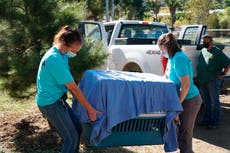Infectious microbes might be able to travel in wildfire smoke, researchers say
Bacteria and fungi are both ‘aerosolized’ and can be transported vast distances in smoke plumes, writes Harry Cockburn

The number and extent of wildfires in areas such as the Amazon, California, Australia and even Siberia, is growing, and the smoke they are producing could provide a medium by which infectious microbes can be transmitted to humans, new research suggests.
Both bacteria and fungi are transmitted in plumes of wildfire smoke, and the risk to human health posed by these living microbes is not well known, according to US scientists.
These particles become aerosolized due to the burning of materials such as soils, detritus and wood, and then become transported in smoke plumes.
The authors of the research, Leda Kobziar, a wildfire scientist at the University of Idaho, and George Thompson III, an infectious disease specialist from the University of California, said “while the pulmonary and cardiovascular consequences of smoke exposure are well known and recognised, the potential for wildfire smoke to be a source of infection has been overlooked and remains unaddressed in public health and wildfire science.”
It is not just the immediate areas on fire which could be a source of infectious microbes, the authors said depending on the size of the fires “microbes may also be drawn into convective columns from outside the combustion zone”.
“Once aerosolized, microbes, spores, or fungal conidia [smaller than 5 micrometres] in aerodynamic diameter have the potential to travel hundreds of miles, depending on fire behaviour and atmospheric conditions, and are eventually deposited or inhaled downwind of a fire.
“Smoke emissions from high-intensity, large wildfires have been transported across continents, increasing particulate matter concentrations in distant locations.”
The paper added: “How far and which microbes are transported in smoke under various conditions are critical unknowns, but the relevance of these questions is increasing with longer wildfire seasons and higher severity trends.”
To date, little research has been done to determine whether the transport of smoke-borne microbes poses a significant health risk, beyond the known from particulate inhalation.
However, the authors said there is “compelling evidence” which shows there are increasing rates of certain fungal infections in areas with increased levels of wildfire smoke.
The scientists said the potential for a wildfire’s microbial content to affect humans who breathe in smoke, particularly from large fires and over long periods, is appreciable.
They said atmospheric and public health sciences must expand their focus to include the potential impact of smoke’s microbial cargo on human populations – a goal that is especially relevant where smokey skies are more likely to become a seasonal norm rather than a rare event.
Wildfires in the western US and Arctic reached “unprecedented intensity” in 2020, separate studies have said.
Particular hotspots this year included Siberia, Colorado, California, Australia, and parts of the Caribbean and the Pantanal region of Southern Brazil.
Satellite monitoring by the Copernicus Atmosphere Monitoring Service (cams) revealed about 1,690 megatonnes of carbon were discharged into the atmosphere from wildfires between 1 January and 7 December this year.
However this is a lower figure than for 2019, when 1,870 megatonnes of carbon was released by wildfires. Part of the reason is because the amount of burning across Africa has been “very low” this year, Cams said.
The satellites showed that smoke plumes from fires in the US travelled to parts of Northern Europe.
Dr Kobziar and Dr Thompson said: “Given that climate change impacts on wildfire are predicted to lead to total emissions (greenhouse and trace gases plus particulate matter) increases of 19 to 101 per cent in California alone through 2100, it is important that atmospheric and public health sciences expand their perspectives to include the potential impact of smoke’s microbial cargo on human populations.”
The research is published in Science magazine.
Join our commenting forum
Join thought-provoking conversations, follow other Independent readers and see their replies
Comments



Bookmark popover
Removed from bookmarks